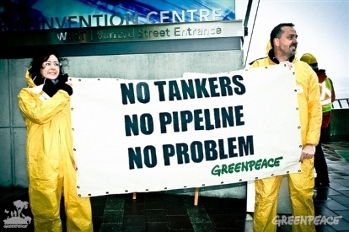Today, Raincoast Conservation Foundation and Georgia Strait Alliance launched a new initiative to study the potential spread of an oil spill in the waters around Vancouver, the Gulf and San Juan Islands, and along the Kinder Morgan oil tanker route through the Salish Sea.
The environmental groups were joined by high school students from the Tsleil-Waututh First Nation, who dropped hundreds of drift cards (small pieces of plywood painted bright yellow) in Vancouver Harbour and English Bay. This event is part of a larger study to produce a series of maps that will improve understanding of the path oil spills might take and how far spilled oil could travel. The cards will be dropped along the oil tanker route in locations where the risk of incidents is higher, and they will carry a simple message: This could be oil.
Members of the public are being asked to get involved in the project by staying on the lookout for the drift cards on local beaches and shores. Each drift card has a unique number identifying the exact time and location at which it was dropped. Those finding the cards will be able to help create maps of potential spill trajectories on by visiting a dedicated website, www.SalishSeaSpillMap.org.
This project is in response to Kinder Morgan’s proposal to twin its sixty-year-old TransMountain pipeline, which would result in a 500 per cent increase in oil tanker traffic through the Salish Sea. The study comes as B.C. and Federal government documents highlight the following facts: Canada is not prepared for a spill, liability insurance is inadequate to pay for the costs of cleaning up a tanker spill, and we do not know how to deal with diluted bitumen in the marine environment.
“Drastic increases in oil tanker traffic means a drastic increase in risk of a diluted bitumen spill, and we are woefully unprepared,” said Alexandra Woodsworth, Energy and Shipping Campaigner at Georgia Strait Alliance. “Our coastal communities, iconic species and the employment of thousands aren’t worth sacrificing for the sake of fifty jobs in B.C.”
The Salish Sea is a unique coastal environment, already under stress from pollution and climate change. It supports a huge variety of marine life, including wild salmon, endangered killer whales and hundreds of species of resident and migratory birds.
“BC’s southern resident killer whales are already endangered. The very real threat to this small population and other marine species isn’t worth the risk for a project with so little benefit for B.C.,“ said Chris Genovali, Executive Director of Raincoast Conservation Foundation.
Thanks to Donna Riordan of Orcas NoCoalition
**If you are reading theOrcasonian for free, thank your fellow islanders. If you would like to support theOrcasonian CLICK HERE to set your modestly-priced, voluntary subscription. Otherwise, no worries; we’re happy to share with you.**








